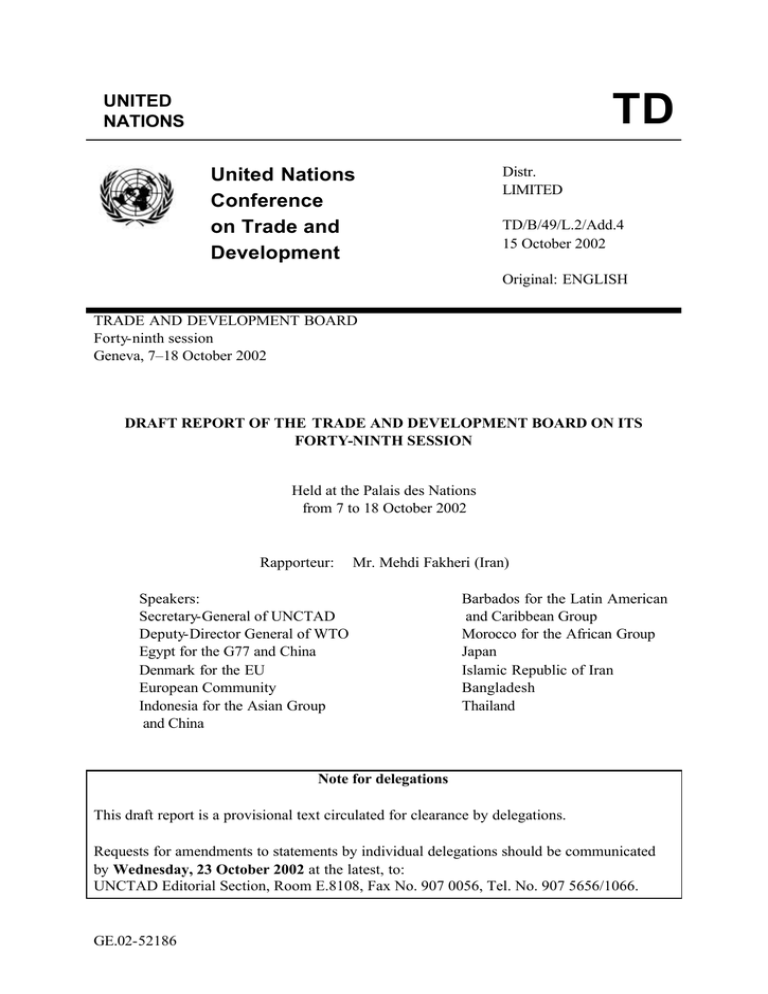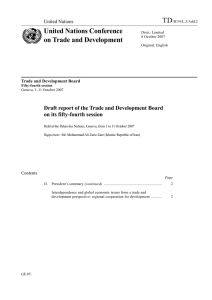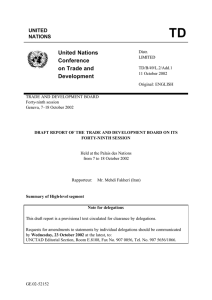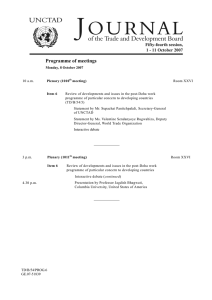TD United Nations Conference
advertisement

TD UNITED NATIONS Distr. LIMITED United Nations Conference on Trade and Development TD/B/49/L.2/Add.4 15 October 2002 Original: ENGLISH TRADE AND DEVELOPMENT BOARD Forty-ninth session Geneva, 7–18 October 2002 DRAFT REPORT OF THE TRADE AND DEVELOPMENT BOARD ON ITS FORTY-NINTH SESSION Held at the Palais des Nations from 7 to 18 October 2002 Rapporteur: Mr. Mehdi Fakheri (Iran) Speakers: Secretary-General of UNCTAD Deputy-Director General of WTO Egypt for the G77 and China Denmark for the EU European Community Indonesia for the Asian Group and China Barbados for the Latin American and Caribbean Group Morocco for the African Group Japan Islamic Republic of Iran Bangladesh Thailand Note for delegations This draft report is a provisional text circulated for clearance by delegations. Requests for amendments to statements by individual delegations should be communicated by Wednesday, 23 October 2002 at the latest, to: UNCTAD Editorial Section, Room E.8108, Fax No. 907 0056, Tel. No. 907 5656/1066. GE.02-52186 TD/B/49/L.2/Add.4 Page 2 Chapter III REVIEW OF DEVELOPMENTS AND ISSUES IN THE POST-DOHA WORK PROGRAMME OF PARTICULAR CONCERN TO DEVELOPING COUNTRIES (Agenda item 6) (Continued) 1. The representative of Belarus said that the post-Doha programme of work reflected the interests of developing countries but had to be followed by concrete actions. His country had introduced trade preferences for LDCs and was in favour of strengthening the provisions on special and differential treatment for developing countries in WTO. In increasing technical assistance to help countries prepare for the new Round, adequate attention should be given to the countries in transition, whether members of WTO or in the process of acceding to WTO. UNCTAD could help with analytical work to identify these interests with a view to providing countries in transition with more efficient technical assistance. Integration into the multilateral trading system should be regarded as an instrument contributing to the implementation of internal reforms and to stable economic development. Differences in levels of economic development and commitments undertaken by member countries would complicate future negotiations. UNCTAD should play an important role in preparing countries for negotiations, providing technical assistance and finding solutions acceptable to all groups. The financial resources for the implementation of technical assistance should be adequate and well managed, while the forthcoming negotiations should be developmentoriented and take into consideration the results of the latest global conferences. 2. The representative of Venezuela endorsed the main conclusions of the Trade and Development Report, namely that the essential preconditions for developing countries to increase their participation in the global economy were the diversification of their exports and the export of value-added products. She also agreed that improved market access, increased financing and debt alleviation were important in helping developing countries to participate more successfully in the globalization process. 3. The world economy and international trade should not be neutral in respect of human development. In Venezuela, ways and means had been found to ensure that economic development was based on social justice, democracy, competition, efficiency and peace. The same principles should inspire the international community. The Doha negotiations should pursue development as the main goal, otherwise the entire Work Programme would loose credibility. Developed countries that were closing their markets to imports from developing countries and were subsidizing their agricultural sector were acting against the interests of the multilateral trade system. 4. UNCTAD was in the best position to support developing countrie s in the effort to incorporate the development dimension in the multilateral and regional trade negotiations. TD/B/49/L.2/Add.4 Page 3 Some issues, because of their complexity and relevance for developing countries, deserved special attention, including energy services, and she encouraged UNCTAD to keep working on that topic. UNCTAD should also support developing countries in the ongoing GATS negotiations, and especially in the request and offer process, to ensure that the liberalization of services markets would be linked to the strengthening of supply and export capacities in developing countries. Other areas where UNCTAD could provide special support were intellectual property rights, transfer of technology, and the interlinkages between trade and environment. 5. The representative of Cuba said that the effective implementation of the Doha Ministerial Declaration could correct the existing imbalances of the multilateral trading system and increase developing country trust in the system. A positive and fair conclusion of the present trade negotiations would depend, more than on the technicalities, on the flexibility that developed countries would show on crucial issues such as S&D, implementation, market access and transfer of technology. However, until now very little progress on these issues had been recorded. 6. Negotiations in new areas - the so-called Singapore agenda – should not start until clear results had been achieved in development-related issues, especially S&D, and, as agreed in Doha, a consensus should be reached at the Fourth Ministerial Conference before negotiations on investment and competition could be considered. The proliferation of unilateral trade measures jeopardized the functioning of the multilateral trade system. 7. Finally, developing countries were finding themselves in an increasingly difficult situation: exports were diminishing, foreign debt was increasing, poverty was more widespread than in the past, and epidemics were frequent. A new international order should be set up to correct the existing imbalances and support the development of all countries. 8. The representative of Nicaragua said that, in the post-Doha process, it was important that the developing countries not be excluded. She expressed concern in connection with the approaching deadlines set in the Fourth Ministerial Declaration in relation to negotiations, particularly for agriculture and with respect to special and differential treatment. Important issues to be taken up at the next WTO Conference in Cancun would include the second phase of work regarding special and differential treatment, and market access, especially for the agricultural sector. In this context, it would be important to work jointly and quickly to reach agreement on agricultural products as the essential element of a single undertaking. It was increasingly difficult to make decisions in the area of trade policies and finance that did not have important national and international social impacts. Finally, she requested UNCTAD to continue to assist developing countries in trade negotiations. 9. The representative of Norway said that one of the most important outcomes of the Doha Ministerial Conference had been the recognition that developing countries, and especially LDCs, should be benefiting more from the increased opportunities and welfare gains generated by the multilateral trading system. In this regard, enhanced market access, balanced rules and well targeted, sustainably financed technical assistance and capacity TD/B/49/L.2/Add.4 Page 4 building programmes had central roles to play. In the new round, improved market access, especially for textiles and clothing and for agricultural products, was a central objective for the developing countries. Norway had abolished its last textile quota as of 1 January 2001 and had granted duty- and quota-free access to all products from LDCs as of I July 2002. With regard to technical assistance, the WTO secretariat, bilateral donors and other agencies should assist the LDCs in defining their need for trade-related technical assistance and capacity building. The WTO’s technical assistance should be directly relevant to the negotiations and the implementation of commitments. Other needs must be met by other organizations, such as UNCTAD, and by bilateral donors within a coherent framework. Finally, Norway agreed that special and differential treatment provisions should not be means of prolonged or indefinite protectionism. The aim was to make sure that the such provisions were tailored to facilitate integration of developing countries into the multilateral trading system at a rate and on conditions commensurate with the individual country’s level of development. Special and differential treatment provisions would be more effective and operational if WTO Members defined which Members qualified as beneficiaries and which Members should be subject to obligations. 10. The representative of China said that the Doha mandate clearly aimed to help developing countries attain their development objectives in the multilateral trading framework by establishing effective measures of special and differential treatment for developing countries. The progress of the Doha mandate to date, however, had been slow, partly due to a negative attitude on the part of developed countries towards changing the inequities in the international trading system. He called upon all parties to abide strictly by the Doha spirit and time frame and take specific measures to resolve the issues of major concern to developing countries with a view to making the new Round a truly “Development Round”. With regard to negotiations on agriculture, contrary to the commitments stipulated in the Doha mandate (i.e. substantial reductions in trade-distorting domestic support, substantial improvements in market access, and reductions, with a view to phasing out, of all forms of export subsides), some developed countries had recently increased spending on subsidies for domestic support, thus creating new obstacles to the new round of the negotiations. Developed countries had to demonstrate their political will to abide by the commitment by substantially cutting agricultural tariffs, narrowing the gap between applied and bound tariffs, simplifying tariff structures, rationalizing their tariff rate/quota regime, limiting and reducing aggregate domestic support levels, and reducing and eventually eliminating export subsides. As regards negotiations on market access for non-agricultural products, markets should be opened rapidly for products of particular interests to developing countries, such as textiles and clothing. Finally, the existing WTO agreement on anti-dumping lacked transparency and predictability, and there was an imbalance in the obligations undertaken by developed and developing countries. China supported efforts to strengthen disciplines to prevent abuse of anti-dumping measures and improve the rules of the existing anti-dumping agreement. 11. The representative of the United States of America said that the development dimension of Doha should address not only the growing need for liberalization of trade of developed countries, but also trade liberalization among developing countries. It was critical TD/B/49/L.2/Add.4 Page 5 to find solutions to issues relating to TRIPs and health, improvement of S&D treatment and problems of implementation before the December 2002 deadlines. 12. Technical assistance to support the post-Doha process was a priority for his Government, and he emphasized his country’s active position with regard to the WTO Trust Fund. In 2001, the United States’ worldwide trade capacity building activities had totalled $556 million, and this figure would continue to grow. These monies must be managed effectively. 13. The Doha Declaration gave UNCTAD a role in supporting negotiations at the WTO, specifically on investment and competition. Activities must not be duplicative, and UNCTAD should focus its work on areas of its comparative advantage and within the mandate of the Bangkok Plan of Action. 14. Trade and investment played a key role in poverty reduction and development in African countries and LDCs. Other important issues for developing countries included liberalization of global trade in agriculture and achieving greater access to developing country farmers; facilitation of WTO rules to allow poor countries to gain greater access to drugs needed to combat HIV/AIDs, malaria and other public health crises; and liberalization of global trade in services. UNCTAD should affirm its support for the spirit and commitments made in Doha and reject efforts of anti- free trade skeptics to thwart trade liberalization. 15. The implementation of the WTO post-Doha work plan represented an important opportunity to address the development concerns of developing countries. In Doha, nations had recognized the tremendous growth that resulted from connecting countries to the global market place. 16. In the conclusion, he raised concerns regarding UNCTAD’s policy advice under the positive agenda and its trade-related technical assistance programme. UNCTAD should focus on building domestic capacity to analyse issues before the WTO in the light of national interests. He wanted to avoid creating dependence on the UNCTAD secretariat. He formulated the same concerns about the post-Doha plan for technical assistance, which had been formulated and implemented without consultations with delegations. He requested information about the status of that plan. 17. The representative of India noted that the WTO system was based on the “single undertaking” and the principle of “one size fits all “. This created a restrictive environment, particularly for industrial policies in such areas as TRIMs and subsidies. Developing countries were at a substantially different stage of development, and therefore had entirely different capacities as compared to developed countries in undertaking multilateral commitments and obligations, as well as benefiting from market access opportunities. 18. A substantial number of proposals had been put forth by developing countries aiming at the full integration of S&D treatment into the WTO rules. Without a new paradigm for TD/B/49/L.2/Add.4 Page 6 S&D treatment, it would be a case of too little too late. Non-reciprocal concessions by developed countries to developing countries under the provisions of the GATT “enabling clause” had been meant to be extended on a non-reciprocal, non-discriminatory and generalized basis, but such concessions were actually being offered on a reciprocal basis and being made contingent on enhanced market access to developing countries. Unfortunately, there was lack of will on the part of developed countries to engage seriously on issues like S&D treatment. The same applied to textiles and clothing. 19. On implementation, he emphasized that all relevant deadlines had been missed. On poverty reduction and food security, developing countries had to maintain tariffs that were consistent with their development, trade and food security needs. Regarding the GATS, Article XIX needed to be operationalized, and meaningful market access had to be achieved in sectors and modes of particular export interest to developing countries, such as movement of natural persons. With regard to market access for goods, while the bound rates of tariffs in developed countries on non-agricultural goods were low on average, tariff rates on certain items of export interest to developing countries were still very high. 20. One of the major achievements of the Doha Ministerial Conference had been the Declaration on the TRIPS Agreement and Public Health. While technical discussions had taken place in the TRIPS Council, an adequate solution had to be found by the end of 2002. 21. Because of its mandate and its comprehensive development vision, UNCTAD was uniquely placed to help ensure that the Doha Agenda would not end up short changing the developing countries. Important tasks faced by UNCTAD included: (a) impact assessment and analysis of existing multilateral trade agreements; (b) di entification of market access barriers faced by developing countries with a view to their reduction and elimination; (c) continuation of work on the “positive agenda”; (d) focussing policy analysis and consensus building on the development dimensions of the multilateral trade system. Other areas of focus included: (a) suggestions for operationalizing S&D treatment provisions in future agreements to defend development objectives; (b) proposals to amend the Agreement on Subsidies and Countervailing Measures to achieve more balance with regard to the interests of developing countries, with particular focus on export credits and domestic subsidies; (c) services, to help developing countries assess trading opportunities and to prepare them for the request process; (d) trade and environment; and (e) Singapore issues, particularly investment and competition. In addition, UNCTAD should come up with proposals on how the TRIPS Agreement could be made to better the technological development of developing countries, inc luding operationalizing paragraph 4 of the Doha Ministerial Declaration on TRIPS and Public Health. Finally, UNCTAD’s work on electronic commerce should continue, with greater focus on developing country conditions and perspectives. 22. The representative of Jordan noted that, as a new member of the WTO, Jordan had derived great benefit from the technical assistance of UNCTAD. He looked forward to the further development of such programmes in the future, designed to meet more closely the needs of newly acceded countries. He noted that, in paragraph 9 of the Doha Ministerial TD/B/49/L.2/Add.4 Page 7 Declaration, the Ministers had admitted that the newly acceded countries had made excessive commitments, including Jordan. 23. Jordan was seeking to liberalize its trade and economy, but this sho uld be done in accordance with its national developments needs. Jordan had finished its round of negotiations two years ago and had had to change and adapt its legislation, tremendously lowering its tariffs and thus loosing one of the principal sources of government revenue. It had also liberalized its services sector and other sectors as well, but today it was being requested to liberalize even more. This would represent a heavy burden, and seemed hardly possible. 24. Finally, technical assistance was important, but it could not be the only form of assistance required. UNCTAD also had to establish training programmes designed to meet the specific needs and levels of commitments of the newly acceded developing countries. 25. The representative of the International Confederation of Free Trade Unions stressed the importance of the Johannesburg commitments on the need to incorporate social, economic and environmental considerations into sustainable development strategies, and the post-Doha work programme should take that into account. With reference to the GATS negotiations, she expressed concern that vital public services were not accessible to many populations. The Word Trade Union Group had issued a common declaration, containing a number of principles that should be taken into consideration within the GATS negotiations. 26. Her organization was not opposed to any negotiation that contributed to job creation, higher salaries and economic development. But public services, including education and health services, were too important to be exposed to private sector competition, and countries should not be forced to privatize. The WTO “lock- in” principle should not be applicable when the liberalization of services led to socio-economic degradation. Further to article XIX of the GATT, an evaluation of the social, environmental and economic impact of negotiations was needed and should be done in cooperation with UN specialized agencies and trade unions. With respect to mode 4 on the movement of physical persons, negotiations should consider all aspects of protection of migrant workers. The issues being taken up in the negotiations were very important and should be discussed with the participation of representatives of parliaments and social partners. 27. The Deputy Secretary-General of UNCTAD, responding to points raised, emphasized that the post-Doha technical assistance plan had been distributed in the Commission on Trade in February 2002; the Secretary-General of UNCTAD, in his letter in mid-February to potential donors, had invited reactions to the plan; the Commission’s outcomes had been reported to the executive session of the Board that had endorsed the plan; a briefing session for all delegations on the post-Doha plan had been held on 22 July, when member States had been informed of the state of the implementation in detail; the matter had been further discussed in the Working Party, and the latest information on the implementation of the Programme provided. The secretariat intended to revisit the programme in the light of rapid developments in the negotiations, and member States would be consulted. Finally, with TD/B/49/L.2/Add.4 Page 8 regard to the commercial diplomacy programme, activities could not be standardized, because they were demand-driven. TD/B/49/L.2/Add.4 Page 9 PROCEDURAL, INSTITUTIONAL, ORGANIZATIONAL, ADMINISTRATIVE AND RELATED MATTERS A. Opening of the session 1. The forty- ninth session of the Trade and Development Board was opened on 7 October 2002 by Mr. Nathan Irumba (Uganda), the outgoing acting President of the Board. B. Election of officers (Agenda item 1 (a)) 2. At its 930th (opening) plenary meeting, on 7 October 2002, the Board elected by acclamation Mr. Dimiter Tzantchev (Bulgaria) as President of the Board for its forty-ninth session. 3. Also at its opening plenary meeting, the Board completed the election of officers to serve on the Bureau of the Board at its forty- ninth session by electing 10 Vice-Presidents and the Rapporteur. Accordingly, the elected Bureau was as follows: President: Mr. Dimiter Tzantchev (Bulgaria) Vice-Presidents: Mr. Iouri Afanassiev Mr. Boniface Chidyausiku Mr. Luiz Felipe de Seixas Corrêa Mr. Nathan Irumba Mr. Toshiyuki Iwado Mr. Douglas M. Griffiths Mr. François Leger Mr. Samuel T. Ramel Mr. Lester Mejía Solís Mr. Eberhard Von Schubert (Russian Federation) (Zimbabwe) (Brazil) (Uganda) (Japan) (United States of America) (France) (Philippines (Nicaragua) (Germany) Rapporteur: Mr. Mehdi Fakheri (Islamic Republic of Iran) 4. In accordance with past practice, the Board agreed that the regional coordinators and China, as well as the Chairmen of the Sessional Committees, would be fully associated with the work of the Bureau. TD/B/49/L.2/Add.4 Page 10 C. Adoption of the agenda and organization of the work of the session (Agenda item 1 (b)) 5. At its opening meeting, the Board adopted the provisional agenda for the session contained in TD/B/49/1. (For the agenda as adopted, see annex … below). 6. At the same meeting, and in accordance with the organization of work for the session in TD/B/49/1, the Board established two sessional committees to consider and report on items on its agenda as follows: Sessional Committee I: Item 4: Progress in the implementation of the Programme of Action for the Least Developed Countries for the Decade 2001-2010: (a) Implementation of UNCTAD-wide activities in favour of LDCs; (b) The least developed country status: Effective benefits and the question of graduation Sessional Committee II: Item 5: UNCTAD’s contribution to the implementation of the United Nations New Agenda for the Development of Africa in the 1990s: Struc tural adjustment and poverty reduction in Africa 7. The following officers were elected to serve on the Bureau of Sessional Committee I: Chairperson: Mr. S. Lazzarotto (Switzerland) Vice-Chairperson-cum-Rapporteur: Ms. W. Tadesse (Ethiopia) 8. The following officers were elected to serve on the Bureau of Sessional Committee II: Chairperson: Mr. F. Samb (Senegal) Vice-Chairperson-cum-Rapporteur: Mr. F. Leger (France) D. Membership of UNCTAD and of the Trade and Development Board 9. At the 930th plenary meeting of the Board, on 7 October 2002, Timor-Leste became a member of UNCTAD, bringing its membership to 192. 10. At the same meeting, Mozambique became a member of the Board, bringing its membership to 148. _____







